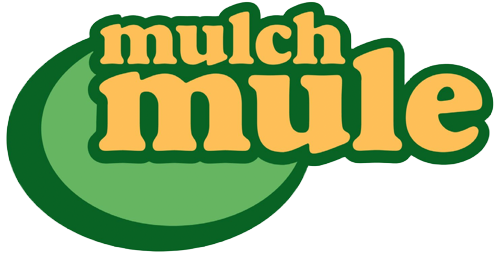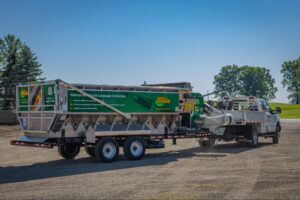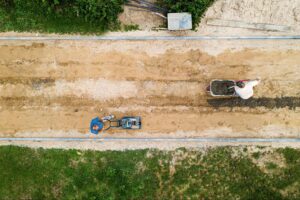In a competitive landscaping market, success relies on innovation, sustainability, and building strong local connections. Landscaping businesses must adapt to evolving customer expectations by integrating modern technology, personalized service, and efficient, eco-friendly solutions that meet today’s environmental standards.
This guide presents focused strategies for boosting local visibility and profitability, highlighting practical approaches for local landscaping marketing—from leveraging advanced tools to optimizing local SEO—that will help your business stand out in today’s dynamic market.
Understanding the Evolving Landscaping Market
The landscaping industry is transforming rapidly as consumers demand more than traditional lawn care. Today’s clients seek eco-friendly solutions, personalized service, and efficiency in every project. Key market trends include heightened environmental awareness, the integration of digital tools for streamlined operations, and a preference for innovative equipment that minimizes labor and maximizes productivity.
Businesses that communicate reliability and adapt to local conditions—such as offering sustainable practices or specialized maintenance schedules—find a receptive audience.
Embracing these changes not only meets customer demands but also positions your company as an industry leader ready to capitalize on the challenges and opportunities. Understanding these evolving dynamics is crucial, as a proactive approach puts you ahead of competitors by aligning your business model with tomorrow’s market expectations.
Identifying Key Customer Needs in Local Landscaping
To thrive in a competitive local market, understanding what your customers truly need is paramount. Clients expect:
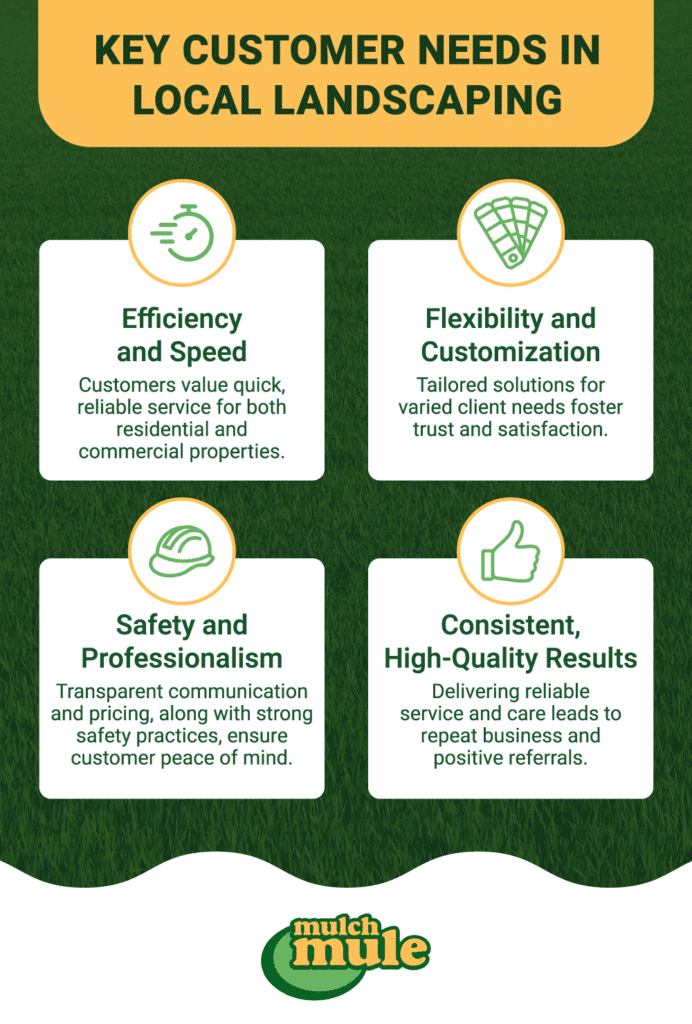
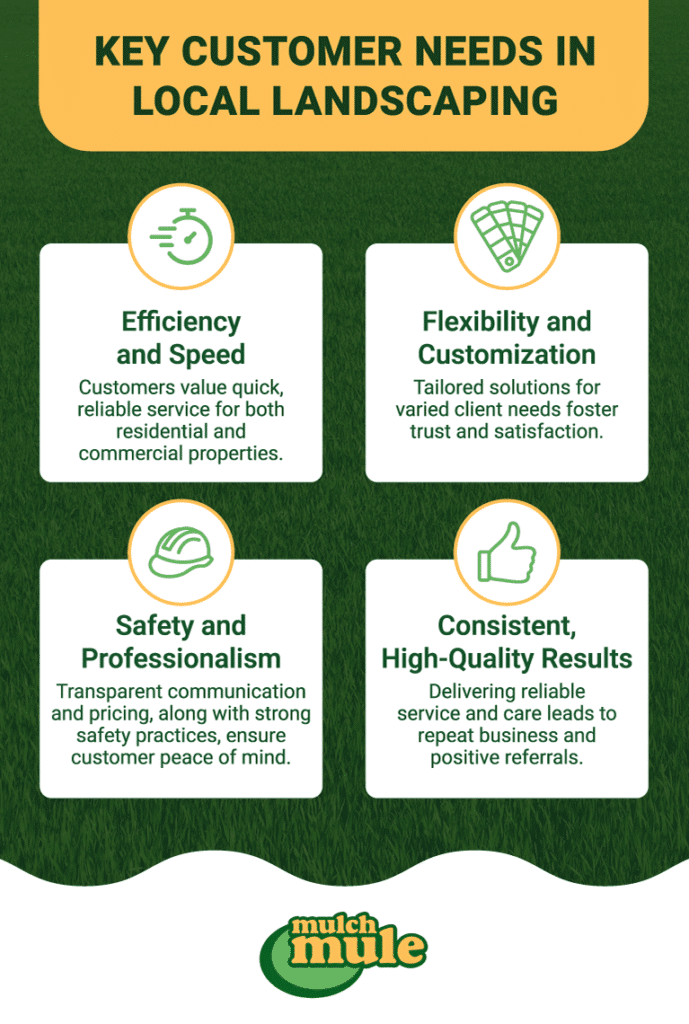
- Efficiency and Speed: Whether for residential lawns or commercial properties, customers appreciate quick, reliable service. Fast turnaround times reinforce your commitment to quality.
- Flexibility and Customization: Different clients require different solutions. From compact residential maintenance to large-scale commercial upkeep, tailoring services to local conditions builds trust by offering flexibility and customization.
- Safety and Professionalism: Clear communication, transparent pricing, and proven safety practices are critical. Demonstrating preparedness and professionalism reassures customers and fosters ongoing relationships.
- Consistent, High-Quality Results: Reliability in service—from proper plant care to meticulous material handling—drives repeat business and positive referrals.
Adapting your services to these specific needs means incorporating streamlined operational processes and bespoke service options. Meeting these criteria elevates your business as one that listens and responds to the unique demands of diverse community segments.
Leveraging Technology to Transform Local Landscaping Services
Modern technology is essential for streamlining operations and enhancing service quality. Landscaping businesses can benefit from adopting digital tools that simplify scheduling, improve client communication, and boost overall productivity.
Improving Scheduling and Communication
Automated scheduling and task organization can simplify appointment bookings, assign work efficiently, and ensure that team members and clients receive timely updates. Using project management platforms such as project management software builds trust through real-time communication and minimizes misunderstandings, ensuring every project runs smoothly.
Optimizing Client Interactions with CRM Systems
Implementing a customer relationship management system helps organize client data, schedule follow-ups, and send timely notifications about seasonal services. By personalizing communications through automated emails or appointment reminders, businesses create lasting relationships that encourage repeat business. With integrated CRM systems, your marketing strategies can be targeted to resonate with specific customer segments while increasing overall efficiency.
Embracing Automation for Efficiency
Adopting automation tools—like certain irrigation solutions or site-assessment aids—reduces manual errors and frees up valuable time for creative, high-impact tasks. This integration of technology not only boosts efficiency but also positions your company as a forward-thinking leader in the local landscaping market. When integrated properly, these digital tools can provide real-time data, helping you forecast demands and manage resources effectively.
Prioritizing Eco-Friendly Landscaping Practices

Sustainability is increasingly important to modern consumers. Eco-friendly practices not only reduce environmental impact but can also translate into real cost savings for property owners.
Using Native, Drought-Tolerant Plants
Providing native and drought-tolerant plant options helps cut maintenance costs and conserves water—benefits highly valued by eco-conscious clients. Landscaping designs that incorporate local flora naturally align with regional climates while promoting environmental responsibility. Such practices reduce dependency on resource-intensive care and enhance the natural beauty of local landscapes.
Implementing Water-Efficient Irrigation
Upgrading to water-efficient solutions such as drip or smart irrigation techniques ensures that landscapes thrive with minimal resource waste. For instance, using water-efficient irrigation methods can result in lower water bills and showcases your commitment to responsible landscaping. In addition, installing drip irrigation allows for precise water delivery that further conserves water and improves plant health.
Reducing Waste with Efficient Material Handling
Investing in advanced equipment that minimizes material waste is a key sustainability strategy. For example, using automated material handling tools to precisely load, transport, and discharge mulch not only improves job site efficiency but also limits environmental impact. Maintaining high standards of eco-friendly operation enhances your business reputation while appealing to clients who prefer environmentally responsible service providers.
Personalizing Services to Meet Local Community Needs
A tailored approach is essential to resonate with local clientele. Personalization helps you address specific community trends and individual preferences, setting your business apart from competitors.
Understanding Local Preferences
Local landscaping solutions should consider unique regional factors such as climate, soil type, and popular design trends. For instance, densely built neighborhoods may favor low-maintenance, space-saving designs, while suburban areas might look for lush, expansive gardens. Conducting local market research—through surveys or online feedback—ensures your services meet real needs. Understanding these subtle local drivers not only enhances customer satisfaction but also builds brand loyalty.
Offering Custom Service Packages
Customized packages can address the diverse demands of homeowners, businesses, and community organizations. Whether it’s offering seasonal maintenance plans for residents or tailored upkeep programs for commercial properties, clear, customized options help attract and retain a varied client base.
Thoughtful bundling of services provides clients with flexibility while ensuring a consistent revenue stream throughout the year.
Engaging with the Community
Participating in local events and educational workshops builds your reputation as a trusted, community-focused partner. Sharing success stories and before-and-after project snapshots reinforces your expertise and demonstrates tangible benefits to potential clients. Active local engagement, whether through sponsorships or community collaborations, significantly enhances your brand visibility and fosters trust among local residents.
Utilizing Innovative Equipment to Enhance Efficiency and Profitability
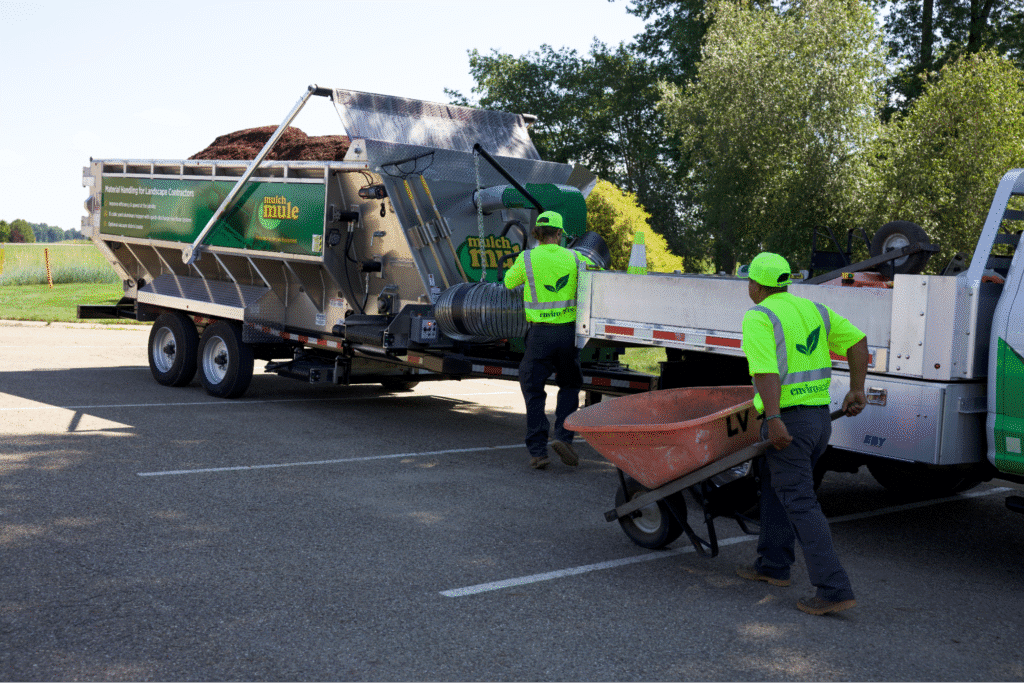
Modern landscaping equipment can dramatically cut labor costs and boost productivity. Advanced tools not only simplify operations but also deliver safer and more consistent results.
The Impact of Specialized Equipment
Mechanized solutions reduce the physical strain on workers and speed up project timelines. For example, high-capacity trailers with live floor systems can significantly decrease the time spent loading and unloading heavy materials, giving your team more time to focus on creative, high-value tasks. This shift toward mechanization can result in decreased downtime and higher overall profitability.
Spotlight on the Mulch Mule Trailer
The Mulch Mule is an excellent example of modern landscaping equipment. Designed to handle a variety of materials, it features a 15-cubic yard aluminum hopper that discharges materials in seconds and supports optional upgrades such as a vacuum debris loader.
Achieve true mulching mastery by effortlessly unloading wheelbarrow loads in just 3-6 seconds, offering a fast and plant-friendly alternative to traditional blowers. As a trailer, it excels with forward and reverse Live Floor action, simplifying the loading and unloading of skidded materials, complemented by a handheld remote for precise and rapid discharge of various bulk materials.
Watch the video below to learn more about how Mulch Mule provides invaluable features for landscaping businesses.
VIDEO: Mulch Mule General3 – Providing all the features: https://youtu.be/5t50lbUHQ0I?si=ol8qa8sAgH5s6qxi
While equipment like this can greatly improve efficiency, business owners should note the upfront investment, necessary staff training, and ongoing maintenance requirements to keep everything running smoothly. By carefully assessing these factors, you can ensure the equipment delivers reliable returns for your operations.
Optimizing Local SEO and Online Marketing Strategies
A robust online presence is indispensable for attracting local customers. Effective digital marketing ensures that your business is easily found by those in need of landscaping services.
Leveraging Location-Specific Keywords
Focus on integrating location-based keywords throughout your online content. Use phrases such as “landscaping services in [City Name]” in titles, service descriptions, and meta tags. This strategy boosts your visibility in local search results and ensures that potential clients find your business when they search for services in their immediate area.
Enhancing Your Online Profile
Ensure your business profile is consistently updated with accurate contact information, high-quality project photos, and compelling customer testimonials. An optimized online profile not only builds credibility but also drives engagement by showcasing your expertise and tangible results.
Engaging with Visual Content
High-quality visuals—such as before-and-after photos or short project videos—capture attention and clearly demonstrate the quality of your work. Sharing these images on social media platforms can increase local engagement and build trust with prospective clients. A consistent visual narrative supported by high-quality visuals can significantly boost your online reputation.
Promoting Localized Deals and Seasonal Services
Run targeted promotions that address local needs and seasonal trends. Whether it’s special rates for spring garden preparation or fall cleanup, timely offers encourage immediate engagement and help maintain a steady flow of local business. Tailoring these promotions not only brings in seasonal revenue but also establishes your business as responsive to community needs through effective localized deals.
Developing Year-Round Landscaping Strategies
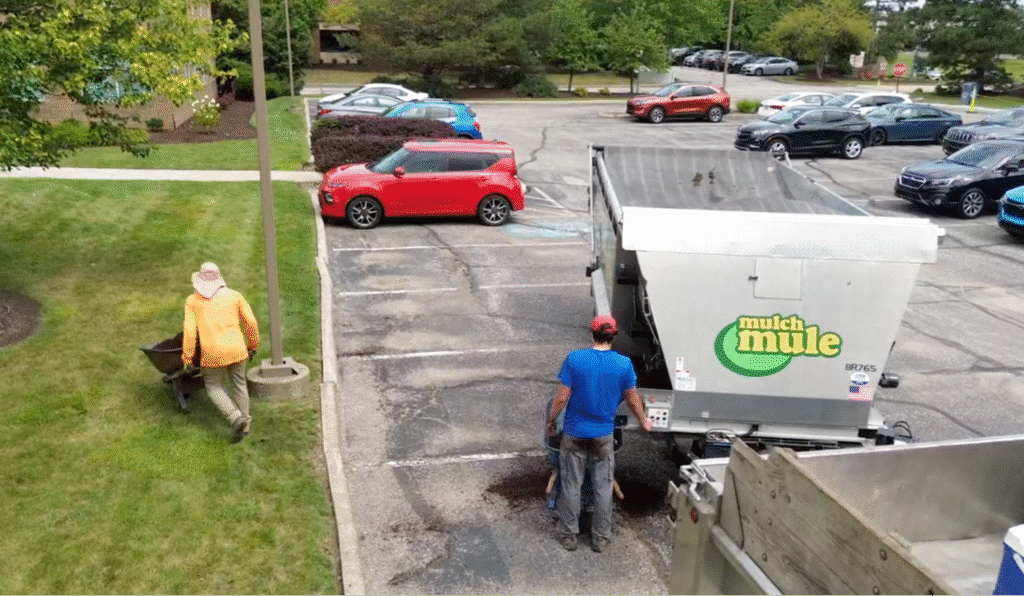
Expanding your service offerings to include year-round solutions is a powerful strategy to maintain a steady revenue stream and build long-term client relationships. While spring and summer are traditionally busy seasons, winter and fall can also offer significant opportunities if approached strategically.
Expanding Seasonal Services
Consider diversifying your services by adding seasonal maintenance solutions—such as snow removal—to complement traditional landscaping work. This diversification not only maximizes the use of your equipment but also demonstrates your commitment to comprehensive service, ensuring clients’ year-round needs are met by one trusted provider.
Leveraging Equipment for Diverse Applications
Investing in versatile machinery can help streamline operations throughout each season. Tools that allow for rapid adaptation—such as moving bulk materials during peak seasons or handling debris during the fall—help maximize productivity and reduce seasonal downtime. Proper staff training further enhances results, ensuring your team can quickly shift from one application to another.
Long-Term Financial Benefits
Implementing year-round strategies can stabilize your cash flow and reduce the cyclical nature of landscaping work. Clients value providers who can manage their various needs without the hassle of coordinating multiple contractors. A reputation as a full-service provider not only builds customer loyalty but also positions your business as a reliable, consistent partner in the community.
Building Strong Relationships with Local Customers
Cultivating strong, lasting relationships with local customers is critical for sustained success. A reputation for reliability combined with exceptional service creates a network of loyal clients who become advocates for your business.
Emphasizing Exceptional Customer Service
Providing timely responses, personalized follow-ups, and top-quality service are key components of effective customer relationship management. Creating a system for regular feedback not only helps you tailor your offerings but also ensures that any issues are resolved quickly.
Implementing Loyalty Programs
Developing loyalty initiatives that reward repeat customers can serve as a powerful tool for customer retention. Clients who feel appreciated are more likely to refer friends and neighbors, extending your reach through word-of-mouth marketing and reinforcing your position in the community.
Fostering Community Engagement
Active participation in local events, sponsorships, and civic initiatives underscores your commitment to the community. By aligning your brand with community values and priorities, you create an emotional connection that goes beyond transactional relationships. This approach not only leads to repeat business but also reinforces your reputation as an integral and trusted part of the local landscape.
Monitoring Market Trends and Competitor Strategies
Staying informed about market trends and competitor strategies is crucial for continual improvement and long-term competitiveness. Regular monitoring enables you to adjust your tactics in response to emerging needs and innovative practices.
Keeping Abreast of Industry Developments
Stay updated on technological advancements, emerging design trends, and shifts in consumer behavior by subscribing to industry journals, attending expos, or following thought leaders. This can provide crucial insights that help you adapt your service offerings proactively.
Analyzing Competitor Offerings
Conducting regular competitor analysis reveals opportunities to differentiate your services. Comparing pricing, service quality, and innovative practices enables you to fine-tune your marketing strategies, ensuring your offerings remain competitive and compelling.
Using Data-Driven Approaches
Incorporating data analytics into your decision-making process helps quantify customer satisfaction and market performance. Regular reviews of financial metrics, client feedback, and operational data allow you to identify trends and make informed resource decisions, fostering continuous improvement within your team.
Enhance Your Local Landscaping Marketing Game for Success
Success in the local landscaping market requires a blend of technological adoption, sustainable practices, and personalized local engagement. By focusing on customer needs, streamlining operations, implementing eco-friendly strategies, and maintaining a strong online presence, your business can stand out and thrive.
Consider integrating game-changing equipment like the Mulch Mule into your operations to further enhance efficiency and safety. Embrace these strategies to position your company as a forward-thinking, community-focused leader in the landscaping industry. Get ready to build lasting local relationships and drive sustainable growth as you meet the evolving demands of the market.
